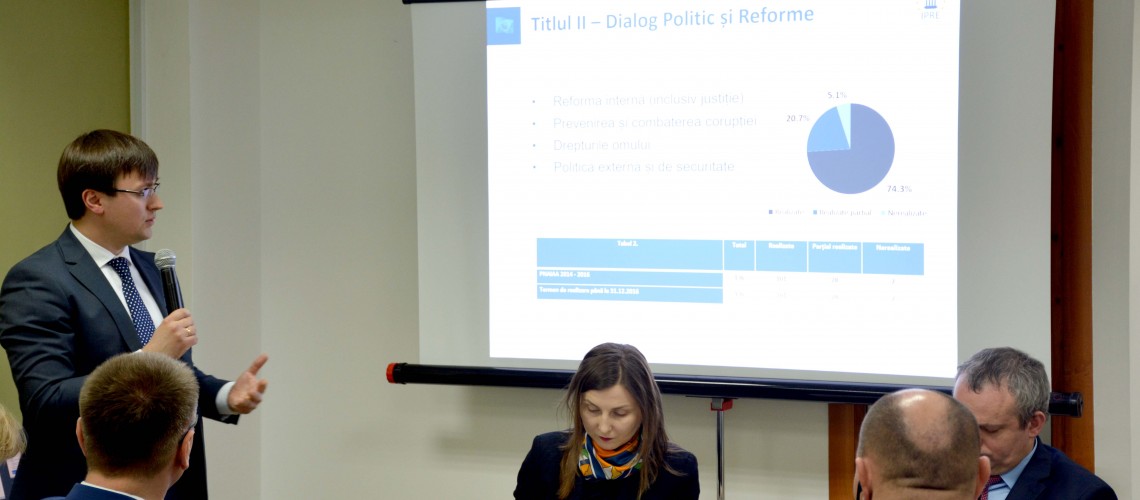IPRE Report: The practical implementation of the Association Agreement remains the main problem for the Moldovan authorities

The statistical rate of implementation of the Association Agreement is 63,1%, whilst the majority of implemented measures are of a legislative nature. However, the qualitative analysis of the Report shows as series of deficiencies, with deficient or late implementation of the reforms in key areas such as the rule of law, justice, fight against high level corruption, independent mass-media. Thus, the statistical indicator does not reflect the real condition of the results of undertaken actions. The practical implementation of the Association Agreement remains the main problem for the Moldovan authorities.
This is the main conclusion of the team of experts of the Institute for European Policies and Reforms (IPRE), voiced at today’s presentation of the Shadow Progress Report on the implementation of the Association Agreement. The event was organised by IPRE in cooperation with the Konrad Adenauer Foundation, part of the project “Monitoring of implementation of the EU-Moldova Association Agreement”. The event gathered representatives of the national public authorities, experts from civil society and representatives of the development partners.
„The Report developed by IPRE aims to supplement the assessment of the Moldovan authorities and of the European Commission with an alternative perspective of the level of implementation of the Association Agreement. Besides the statistical analysis of implementation of commitments in the National Implementation Plan (2014-2016), we paid a particular attention to the qualitative analysis of the attained results. The main reason for it is that there is a difference between the statistical indicator of performance and the qualitative one. Thus, although a general implementation rate of 63,1% from the National Implementation Plan for 2014-2016 is attained, it does not necessarily reflect the real condition on the undertaken actions in key areas such as rule of law, justice, fight against high level corruption, independent mass-media. The practical implementation of the Association Agreement is the main problem of the Moldovan authorities. European integration is excessively politicised, both at the internal as well as the geo-politic levels. This in turn has diminished the support from the citizens towards the European perspective, as the level of trust in public institutions has decreased. With all these in mind, the EU remains the most important economic and development partner of the Republic of Moldova”, concluded Iulian Groza, the executive Director of IPRE.
Also, Ms. Daniela Morari, vice-minister of External Affairs and European Integration, present at the event, stated that: „We can say that the month of March is dedicated to the Association Agreement between the EU and Moldova, which will conclude with the EU-Moldova Association Council, due to take place on the 31st of March 2017. The IPRE Report is the only document which contains an alternative analysis, aimed to complement our efforts. It is very important to have different views and recommendations from the civil society to further improve the current process and achieve common results”.
Mr. Mindaugas Kacerauskis, charge d’affaires a.i. of the EU Delegation to Moldova, welcomed the efforts of the civil society and encouraged the active involvement of the experts in the monitoring of processes: „In spite of the benefits the EU-Moldova Association Agreement offers, we consider that a series of deficiencies of practical application must be resolved. No sector can progress if political involvement and corruption in the justice sector is not eliminated, while we are worried that mass-media is concentrated and monopolized. Also, the adoption of a number of laws is important, which will lead to business and economic development, but the main concern should be their implementation. The EU will continue to monitor the efforts of the Government, whilst the expertise of the civil society will be helpful for us”, Mr. Kacerauskis mentioned.
During the debates on the conclusions of the Report, the participants have welcomed the opportunity of such a report, which present a shadow view on the implementation of the Association Agreement and offered a series of recommendations on the report and on the next evaluation exercise.
„The support of the effort of implementation of the EU-Moldova Association Agreement is one of the main priorities of the Konrad Adenauer Foundation. That is why we decided to support the efforts of IPRE to have an independent monitoring of its implementation” added Mrs. Anna Severin, Programme coordinator of the Chisinau Office of the Konrad Adenauer Foundation.
IPRE will present the next shadow Progress Report on the implementation of the Association Agreement at the end of 2017. It will evaluate more specifically the quality and impact of the implemented measures within certain high priority areas of the Association Agreement, identified in advance with the participation of the experts from civil society, public authorities and development partners.
The electronic version of the Report may be consulted here.
The summary and the main recommendations of the report may be accessed here in Romanian and English.
The video recording of the event may be followed here.












